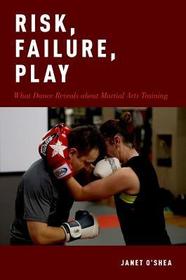
Risk, Failure, Play
What Dance Reveals about Martial Arts Training
- Publisher's listprice GBP 38.49
-
18 388 Ft (17 512 Ft + 5% VAT)
The price is estimated because at the time of ordering we do not know what conversion rates will apply to HUF / product currency when the book arrives. In case HUF is weaker, the price increases slightly, in case HUF is stronger, the price goes lower slightly.
- Discount 10% (cc. 1 839 Ft off)
- Discounted price 16 549 Ft (15 761 Ft + 5% VAT)
Subcribe now and take benefit of a favourable price.
Subscribe
18 388 Ft

Availability
printed on demand
Why don't you give exact delivery time?
Delivery time is estimated on our previous experiences. We give estimations only, because we order from outside Hungary, and the delivery time mainly depends on how quickly the publisher supplies the book. Faster or slower deliveries both happen, but we do our best to supply as quickly as possible.
Product details:
- Publisher OUP USA
- Date of Publication 22 November 2018
- ISBN 9780190871543
- Binding Paperback
- No. of pages248 pages
- Size 155x236x17 mm
- Weight 358 g
- Language English
- Illustrations 24 photographs 0
Categories
Short description:
Risk, Failure, Play takes readers through the politics of everyday life as experienced through fight sport training. It intertwines personal experience and scholarly research, producing powerful reflections on pleasure, mastery, vulnerability, pain, and identity.
MoreLong description:
Risk, Failure, Play illuminates the many ways in which competitive martial arts differentiate themselves from violence. Presented from the perspective of a dancer and writer, this book takes readers through the politics of everyday life as experienced through training in a range of martial arts practices such as jeet kune do, Brazilian jiu jitsu, kickboxing, Filipino martial arts, and empowerment self-defense. Author Janet OâShea shows how play gives us the ability to manage difficult realities with intelligence and demonstrates that physical play, with its immediacy and heightened risk, is particularly effective at accomplishing this task. Risk, Failure, Play also demonstrates the many ways in which physical recreation allows us to manage the complexities of our current social reality. Risk, Failure, Play intertwines personal experience with phenomenology, social psychology, dance studies, performance studies, as well as theories of play and competition in order to produce insights on pleasure, mastery, vulnerability, pain, agency, individual identity, and society. Ultimately, this book suggests that play allows us to rehearse other ways to live than the ones we see before us and challenges us to reimagine our social reality.
This book does an impressive job of providing examples of self-defense training as work and as play, including the differences between men and women. This is an excellent read for those interested in sport psychology and sport sociology.
Table of Contents:
Introduction: Why do you do this? Experiencing Humanity in Combat Play
Chapter One: No Hard Feelings: Why Martial Arts Doesn't Mean what Violence Means
Chapter Two: The Magic Ring: How Combat Sport Transforms Meaning through Space and Movement
Chapter Three: Chess with Cardio: Finding the Meeting Point in Sport Fighting
Chapter Four: What's there to Lose? Vulnerability in Combat Sport
Chapter Five: On the Line: The Pleasure of Risk versus the Culture of Fear
Chapter Six: Fail Better: The Paradox of Defeat in Martial Arts Training
Chapter Seven: Making Play Work: Competition, Spectacle, and Perfection in Sport
Chapter Eight: Making Work Play: Rethinking Competitive Pleasure through Self-Defense Training
Conclusion: A Crisis of Play?
References
Index




